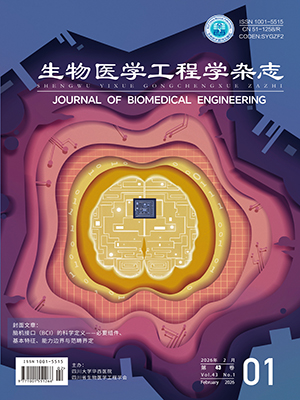| 1. |
Hu J X, Zhao C F, Chen W B, et al. Pancreatic cancer: A review of epidemiology, trend, and risk factors. World J Gastroenterol, 2021, 27(27): 4298-4321.
|
| 2. |
Xu Y, Jia Z, Wang L B, et al. Large scale tissue histopathology image classification, segmentation, and visualization via deep convolutional activation features. BMC Bioinf, 2017, 18(1): 1-17.
|
| 3. |
Yan R, Ren F, Wang Z, et al. Breast cancer histopathological image classification using a hybrid deep neural network. Methods, 2020, 173: 52-60.
|
| 4. |
Elmore J G, Longton G M, Carney P A, et al. Diagnostic concordance among pathologists interpreting breast biopsy specimens. JAMA, 2015, 313(11): 1122-1132.
|
| 5. |
Campanella G, Hanna M G, Geneslaw L, et al. Clinical-grade computational pathology using weakly supervised deep learning on whole slide images. Nat Med, 2019, 25(8): 1301-1309.
|
| 6. |
Xing F, Xie Y, Su H, et al. Deep learning in microscopy image analysis: A survey. IEEE Trans Neural Netw Learn Syst, 2017, 29(10): 4550-4568.
|
| 7. |
支佩佩, 邓健志, 钟震霄. 基于卷积和注意力机制的医学细胞核图像分割网络. 生物医学工程学杂志, 2022, 39(4): 730-739.
|
| 8. |
Wang X, Chen Y, Gao Y, et al. Predicting gastric cancer outcome from resected lymph node histopathology images using deep learning. Nat Commun, 2021, 12(1): 1-13.
|
| 9. |
Fu H, Mi W M, Pan B J, et al. Automatic pancreatic ductal adenocarcinoma detection in whole slide images using deep convolutional neural networks. Front Oncol, 2021, 11: 665929.
|
| 10. |
Janssen B V, Theijse R, van Roessel S, et al. Artificial intelligence-based segmentation of residual tumor in histopathology of pancreatic cancer after neoadjuvant treatment. Cancers, 2021, 13(20): 5089.
|
| 11. |
Huang X, Ding L, Liu X, et al. Regulation of tumor microenvironment for pancreatic cancer therapy. Biomaterials, 2021, 270: 120680.
|
| 12. |
金旭, 文可, 吕国锋, 等. 深度学习在组织病理学中的应用综述. 中国图像图形学报, 2020, 25(10): 1982-1993.
|
| 13. |
Sirinukunwattana K, Alham N K, Verrill C, et al. Improving whole slide segmentation through visual context—a systematic study// International Conference on Medical Image Computing and Computer-Assisted Intervention. Granada: MICCAI Society, 2018: 192-200.
|
| 14. |
Zhang R. Making convolutional networks shift-invariant again// International Conference on Machine Learning. Long Beach: IMLS, 2019: 7324-7334.
|
| 15. |
Azulay A, Weiss Y. Why do deep convolutional networks generalize so poorly to small image transformations? J Mach Learn Res, 2018, 20(184): 1-25.
|
| 16. |
Mikołajczyk A, Grochowski M. Data augmentation for improving deep learning in image classification problem// 2018 International Interdisciplinary PhD Workshop (IIPhDW). Świnoujście: IEEE, 2018: 117-122.
|
| 17. |
张墺琦, 亢宇鑫, 武卓越, 等. 基于多尺度特征和注意力机制的肝脏组织病理图像语义分割网络. 模式识别与人工智能, 2021, 34(4): 375-384.
|
| 18. |
Zhao B, Han C, Pan X, et al. RestainNet: a self-supervised digital re-stainer for stain normalization. Comput Electr Eng, 2022, 103: 108304.
|
| 19. |
Xu Z. Computational models for automated histopathological assessment of colorectal liver metastasis progression. London: Queen Mary University of London, 2019.
|
| 20. |
Ruder S. An overview of multi-task learning in deep neural networks. arXiv preprint arXiv, 2017: 1706.05098.
|
| 21. |
Zhang Y, Li H, Du J, et al. 3D multi-attention guided multi-task learning network for automatic gastric tumor segmentation and lymph node classification. IEEE Trans Med Imaging, 2021, 40(6): 1618-1631.
|
| 22. |
Woo S, Park J, Lee J Y, et al. CBAM: Convolutional block attention module// Proceedings of the European Conference on Computer Vision (ECCV). Munich: ECCV, 2018: 3-19.
|
| 23. |
Tan M, Le Q. Efficientnet: Rethinking model scaling for convolutional neural networks// International Conference on Machine Learning. Long Beach: IMLS, 2019: 6105-6114.
|
| 24. |
Hu J, Shen L, Sun G. Squeeze-and-excitation networks// Proceedings of the IEEE Conference on Computer Vision and Pattern Recognition. Salt Lake City: IEEE, 2018: 7132-7141.
|
| 25. |
Cui Y, Jia M, Lin T Y, et al. Classbalanced loss based on effective number of samples// Proceedings of the IEEE/CVF Conference on Computer Vision and Pattern Recognition. Long Beach: IEEE, 2019: 9268-9277.
|
| 26. |
Lin T Y, Goyal P, Girshick R, et al. Focal loss for dense object detection// Proceedings of the IEEE International Conference on Computer Vision. Hawaii: IEEE, 2017: 2980-2988.
|
| 27. |
He K, Zhang X, Ren S, et al. Deep residual learning for image recognition// Proceedings of the IEEE Conference on Computer Vision and Pattern Recognition. Las Vegas: IEEE, 2016: 770-778.
|
| 28. |
Xie S, Girshick R, Dollár P, et al. Aggregated residual transformations for deep neural networks// Proceedings of the IEEE Conference on Computer Vision and Pattern Recognition. Hawaii: IEEE, 2017: 1492-1500.
|
| 29. |
Huang G, Liu Z, Van Der Maaten L, et al. Densely connected convolutional networks// Proceedings of the IEEE Conference on Computer Vision and Pattern Recognition. Hawaii: IEEE, 2017: 4700-4708.
|
| 30. |
Radosavovic I, Kosaraju R P, Girshick R, et al. Designing network design spaces// Proceedings of the IEEE/CVF Conference on Computer Vision and Pattern Recognition. Seattle: IEEE, 2020: 10428-10436.
|




